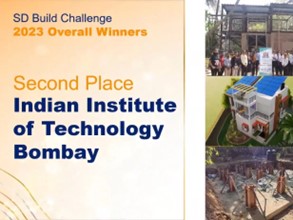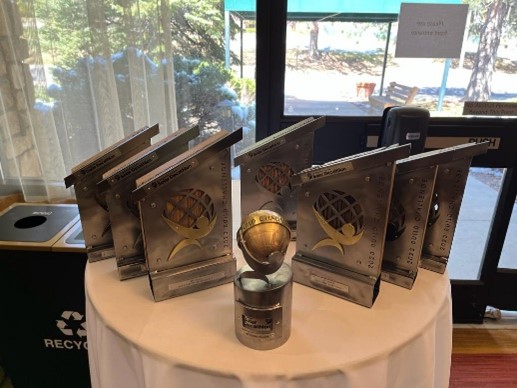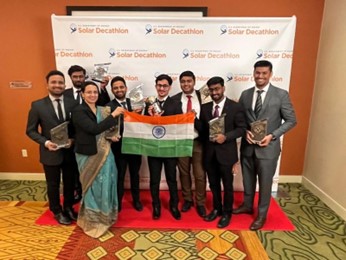Team SHUNYA (Sustainable Housing for Urbanizing Nations by Young Aspirants) is a student technical team of young passionate students from IIT Bombay who have joined hands together for a sustainable future with the help of innovation in the field of housing. The team was founded in 2012 under the guidance of Prof. Rangan Banerjee. We were the only team who represented India in the prestigious Solar Decathlon, often referred to as the ‘Olympics of Sustainable Architecture’ and organised by the US Department of Energy. We aim to build “affordable prefabricated net-zero solar-powered houses” and secure India’s future energy concerns. We strive to develop technology to build a solar-powered, sustainable house for the Indian middle class, which could serve as the answer to India’s growing energy and housing crisis.

Team SHUNYA performed consistently across all 10 of the competition contest criteria and placed first in two contests, ranked second in two, and came third in three other contests. The disappointed team came very close to placing first in the overall standing and lost the premier position to the eventual winners only by a minuscule margin of less than 0.2%.
As part of their submission, Team SHUNYA successfully demonstrated a house that is Net Positive Energy, Net Zero Water, and Net Zero Carbon through a methodology that can be replicated across India for its diverse climatic conditions and social backgrounds. For their final submission, the team collaborated with over 30 industry partners, including startups from IIT Bombay Alumni.
Technical Details of the House Developed by Team SHUNYA

The house has a 14-kW solar PV Plant with an advanced in-house automation system. The automation system controls the in-house developed dehumidifier system designed especially for the climatic conditions of coastal regions. The house is energy efficient through passive design choices of the wall assembly and appliances as well as active control of lighting and HVAC, reducing consumption by 33% compared to a typical two-bedroom house of comparable size. It consumes nearly 80% less water than a regular house with its water-efficient fixtures, recycling system, and rainwater harvesting system. With advanced recycled carbon-neutral construction materials, it has achieved its objective of being net zero carbon, thereby contributing to India’s overall objective of becoming net zero carbon across the nation. Through its social outreach programmes, the team was able to reach thousands of Indians and make them aware of sustainable living.
Team SHUNYA – the Core Team
The team included more than 50+ students from multidisciplinary backgrounds including engineering, architectural, and management. Together, they represented 16+ departments of IIT Bombay and were supported by 8 faculty advisors.
The core student team members include Mr. Prabhat Sharma (Team Lead), Mr. Ayush Singh (Deputy Team lead), Mr. Ankush Pujari (Project Manager – Industry Collaboration), Mr. Ankan Karmakar (Project Manager – Construction), and Mr. Jash Sravia (Project Manager – Outreach).
Faculty members from the Institute who mentored Team SHUNYA include Prof. Venkata Santosh Kumar Delhi, Dept. of Civil Engineering; Prof. Anupama Kowli and Prof. Rajesh Zele, Department of Electrical Engineering; Prof. Arnab Jana, Centre for Urban Science and Engineering (CUSE); Prof. Rangan Banerjee, Prof. Zakir Rather and Prof. Anish Modi from the Department of Energy Science and Engineering (ESE); and Prof. Milind Rane, Department of Mechanical Engineering.

The Dean ACR Newsletter spoke to the winning Team SHUNYA and got an insight into how they came together as a team and won such a prestigious prize. The team leader of Team SHUNYA, Mr. Prabhat Sharma, spoke on behalf of the team.
Team SHUNYA is a completely student-led multidisciplinary team. We have 57 team members comprising students from over 17 departments. These include students from architecture, engineering as well as management. All these diverse individuals are united for a common aim, which is to revolutionise the sustainable housing sector in the country. We have about 8 faculty advisors across various disciplines of IIT Bombay who have constantly guided and supported the team.
As I mentioned above, Team SHUNYA was founded in 2012 under the guidance of Prof. Rangan Banerjee and since then the team has completed 4 projects.
We participated in the Solar Decathlon (2014), Versailles, France, where we received Honourable Mention in Sustainability for Project H-naught (H0) which was a ground-floor building.
In 2018, we were awarded the Best Participation Award at Solar Decathlon Dezaou, China, for Project Solarise, which was a G+1 building.
During the pandemic phase, the team switched to the design challenge and we were the runner-up at the US Solar Decathlon design challenge where the team designed an attached housing society (10 houses) of an artist village in Navi Mumbai. This was called Project Daksh.
Our latest is Project Vivaan for which we received funding of $50,000 from the US Department of Energy and placed second in the US Solar Decathlon build challenge.
We aim to build “affordable prefabricated net-zero solar-powered houses” that will make India’s future energy secure. We strive to develop technology to build a solar-powered, sustainable house for the Indian middle class, which could serve as the answer to India’s growing energy and housing crises.
Our mission is three-pronged:
– Bring about a change in the Indian building industry by demonstrating the affordability of sustainable housing
– Formulating and documenting a design process that could be replicated to create sustainable homes in a resource-efficient way
– Raising awareness in the nation about energy efficiency, responsible energy use, and the potential of renewable technology with an emphasis on solar energy

The actual process of building sustainable housing starts with the design itself. While designing the house, the 3 P’s of Sustainability i.e., planet, people, and profit are considered. Windows are chosen to maximise natural ventilation and optimise daylight to reduce artificial lighting. The landscaping is planned to utilise the excavated stones and natural resources. Materials are selected for their lower u-value that provide better thermal comfort and circular life and is produced from natural material to reduce embodied carbon emissions. Greywater recycling, rainwater harvesting, and water-efficient fixtures are used to reduce water consumption. Finally, renewable energy generation technologies are selected to satisfy the energy consumption of the building.
Speaking specifically about our project, Project Vivaan is a fully functional net-zero building. Our house is net zero in three aspects – energy, carbon, and water. Most of the materials that we have used here are green and have a minimum or negative carbon footprint.
According to IGBC standards, if a house recycles more than 80% of its water, it is termed a net zero water house. As a result of grey-water recycling, rainwater harvesting, and water-efficient fixtures of UPIC 3-star rating, Vivaan ended up reusing 82% of the 668 litres of water required every day. This house is net positive energy owing to the abundant solar energy available in countries like India. With 24 half-cut mono PERC panels, we were able to generate about 13.5 kWh per day. Using inverters, batteries, and grid islanding, the house will be able to function day and night across seasons.
Our current project Vivaan has been designed keeping in mind a family of 4, i.e. parents and 2 children in our target market of Navi Mumbai. By the 10th year of Vivaan’s lifecycle, the additional investment costs will be returned. However, a conventional house won’t provide the buyer any savings and after the 10-year mark of recovering its initial cost, Vivaan would still provide the owner a huge sum of savings every year. Moreover, the previous project of Team SHUNYA i.e. Project Daksh, Project Solarize, and Project H-naught are designed for different climatic conditions and target groups from High-Income Groups (HIG) to Low-Income Groups (LIG).

We received whole-hearted support from the Institute throughout the project. Our network consists of 8+ faculty advisors across various disciplines of IIT Bombay who have constantly guided and supported us throughout the project. The Institute has been immensely supportive – whether it was monetary support, providing us with the land for the project, or with support for all the team’s activities, IIT Bombay helped us achieve our vision.
The house will be a living lab for Team SHUNYA where we will perform post-construction experiments and look for discrepancies between simulation results and experimental results. The experiment for the development of new technologies will also be performed in the house. Currently, discussions are underway to include the house as a case study in different courses at the institute.
We have also received requests for the construction of about 7 residential buildings and farmhouses. We were also approached by 2 builders to construct net-zero buildings. We will also be collaborating with the City and Development Industrial Corporation (CIDCO) for a mass housing project. As a team that envisions revolutionising the sustainable housing sector, we wish to take our project to the masses and transform sustainability into a norm rather than a trend.
We know that there is still a long way to go in making the building sector more sustainable. Our team remains committed to driving positive change and finding new ways to create more sustainable buildings. We believe that through continued innovation and collaboration, we can build a more sustainable future for all.
IIT Bombay is delighted at Team SHUNYA’s outstanding efforts – their hard work, dedication, and innovative ideas have not only earned them a well-deserved victory but have also ensured that the future is bright for a sustainable India. Team SHUNYA’s achievement highlights the power of creativity and teamwork whilst tackling sensitive challenges facing the world today and is an inspiration to other students of IIT Bombay. Undoubtedly, Team SHUNYA’s passion for creating positive change and its commitment to sustainability will have a significant impact on the world.
Congratulations, once again, to Team SHUNYA! We cannot wait to see what the future holds for them!
Team SHUNYA Website: Team Shunya
Team SHUNYA YouTube: Team SHUNYA IIT BOMBAY – YouTube
Team SHUNYA LinkedIn: Team SHUNYA, IIT Bombay | LinkedIn
Team SHUNYA Instagram: https://www.instagram.com/teamshunya_iitb/

